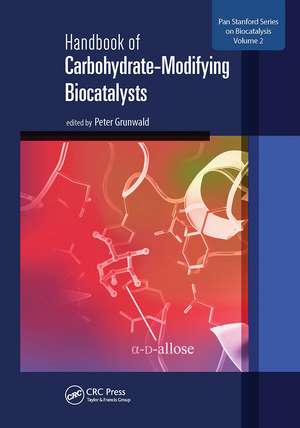Handbook of Carbohydrate-Modifying Biocatalysts: Jenny Stanford Series on Biocatalysis
Editat de Peter Grunwalden Limba Engleză Hardback – 12 aug 2016
The updated content of the second edition of this book has been extended by discussing the current state of the art of using recombinantly expressed carbohydrate-modifying biocatalysts and the synthesis of minicellulosomes in connection with consolidated bioprocessing of lignocellulosic material. Furthermore, a synthetic biology approach for using DAHP-dependent aldolases to catalyze asymmetric aldol reactions is presented.
Preț: 1898.62 lei
Preț vechi: 2546.94 lei
-25% Nou
Puncte Express: 2848
Preț estimativ în valută:
363.47€ • 374.01$ • 306.38£
363.47€ • 374.01$ • 306.38£
Comandă specială
Livrare economică 08-22 februarie
Doresc să fiu notificat când acest titlu va fi disponibil:
Se trimite...
Preluare comenzi: 021 569.72.76
Specificații
ISBN-13: 9789814669788
ISBN-10: 9814669784
Pagini: 1056
Ilustrații: 2296
Dimensiuni: 152 x 229 mm
Greutate: 1.62 kg
Ediția:1
Editura: Jenny Stanford Publishing
Colecția Jenny Stanford Publishing
Seria Jenny Stanford Series on Biocatalysis
ISBN-10: 9814669784
Pagini: 1056
Ilustrații: 2296
Dimensiuni: 152 x 229 mm
Greutate: 1.62 kg
Ediția:1
Editura: Jenny Stanford Publishing
Colecția Jenny Stanford Publishing
Seria Jenny Stanford Series on Biocatalysis
Public țintă
Academic and PostgraduateCuprins
Basics in carbohydrate chemistry. Glycoconjugates: an overview. Oligosaccharides and glycoconjugates in recognition processes. Glycoside hydrolases. Disaccharide phosphorylases: mechanistic diversity and application in glycosciences. DHAP-dependent aldolases: from flask reaction to cell-based synthesis. Enzymatic and chemo-enzymatic synthesis of nucleotide sugars: novel enzymes, novel substrates, novel products, and novel routs. Iteratively acting glycosyltransferases. Bacterial glycosyltransferases involved in molecular mimicry of mammalian glycans. Sulfotransferases and sulfatases: sulfate modification of carbohydrates. Glycosylation in health and disease. Sialic acid derivatives, analogs and mimetics as biological probes and inhibitors of sialic acid recognizing proteins. Enzymes of the carbohydrate metabolism and catabolism for chemoenzymatic syntheses of complex oligosaccharides. From gene to product: tailor-made oligosaccharides and polysaccharides by enzyme and substrate engineering. Synthesis and modification of carbohydrates via metabolic pathway engineering in microorganisms. Metabolic pathway engineering for hyaluronic acid production. Microbial rhamnolipids. Chitin-converting enzymes. Linear and cyclic oligosaccharides. Fungal degradation of plant oligo- and polysaccharides. Bacterial strategies for plant cell wall degradation and their genomic information. Heterologous expression of cellulolytic enzymes. Engineered minicellulosomes for consolidated bioprocessing. Design of efficient multienzymatic reactions for cellulosic biomass processing.
Notă biografică
Peter Grunwald studied chemistry at the University of Saarbrücken and the University of Hamburg, Germany, where he graduated in the field of high-frequency spectroscopy, and then became a staff member of the Institute of Physical Chemistry. After receiving his PhD in physical chemistry from the Department of Chemistry at the University of Hamburg, he founded a biotechnology research group. He was appointed professor in 2001. His research interests focus on the preparation and properties of immobilized enzymes, kinetics of enzymes in organic solvents, and interactions between biocatalysts and heavy metal ions. Prof. Grunwald is also interested in chemical education, including curriculum development.
Recenzii
"This book represents a timely contribution to the field of carbohydrate-modifying enzymes. In many respects, understanding the chemistry and structural aspects of carbohydrates and their interactions is particularly challenging for students and established scientists alike. The many excellent chapters provide a comprehensive journey into the realm of carbohydrates, from the basics to up-to-date approaches and applications. I recommend this book to my own students and to all scientists interested in gaining advanced knowledge of carbohydrate-modifying enzymes in biological processes."
—Prof. Edward A. Bayer, Weizmann Institute of Science, Israel
"This is an excellent compilation of the latest research in the field of carbohydrate-modifying biocatalysts written by highly recognized experts in the field. With glycoscience and biocatalysis emerging as fundamental contributors to a diverse array of scientific disciplines ranging from pharmaceutical development to renewable energy, this book is particularly timely and should serve as an excellent reference for inspiring scientists and students."
—Prof. Jon S. Thorson, University of Wisconsin-Madison, USA
—Prof. Edward A. Bayer, Weizmann Institute of Science, Israel
"This is an excellent compilation of the latest research in the field of carbohydrate-modifying biocatalysts written by highly recognized experts in the field. With glycoscience and biocatalysis emerging as fundamental contributors to a diverse array of scientific disciplines ranging from pharmaceutical development to renewable energy, this book is particularly timely and should serve as an excellent reference for inspiring scientists and students."
—Prof. Jon S. Thorson, University of Wisconsin-Madison, USA
Descriere
This handbook, with its 24 chapters, provides an actual overview of the structure, function, and application of carbohydrate-modifying biocatalysts. Unlike amino acids and nucleic acids, carbohydrates have been disregarded for a long time by the scientific community, mainly due to their complex structure and a lack of suited experimental methods for structure determination. Meanwhile, the situation changed with increasing knowledge about carbohydrates, glycoconjugates, and carbohydrate-modifying enzymes together with the key roles they play in biological processes such as recognition, signal transduction, immune responses, and others.



